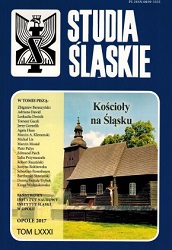Chronica de origine et constitutione Provinciae Bohemiae o. Bernarda Sanninga (1678 rok) jako środek kształtowania nowożytnej tożsamości czeskich reformatorów
Chronica De Origine Et Constitutione Provinciae Bohemiae” by friar Bernard Sannig (1678) as a means of shaping the contemporary identity of the Czech reformers
Author(s): Marcin MusiałSubject(s): History, History of ideas, Social history
Published by: Instytut Śląski
Keywords: Franciscan reformers;monastic historiography;collective identity;
Summary/Abstract: In 1678 Father Bernard Sannig, Provincial Minister of the Czech Franciscan reformers’ province of St. Wenceslaus, completed a manuscript chronicle entitled Chronica de origine... Apart from the history of the whole province or its individual monasteries, he as well depicted therein a circle of persons regarded by himself as particularly meritorious – both lay and ecclesiastical. Tis distinguished work soon became the official historiographic reference used to shape the historical awareness and memory of the Czech reformers. These processes can be considered within a broader context of creating the reformers’ contemporary collective identity, the main originator of which was Sannig himself. If one applies the conceptual framework used by Jörn Rüsen in his considerations, Friar Sannig’s Chronicle might be interpreted – with regard to both its form and its content – in a broader context of identity and creation. This is because Friar Sannig deliberately creates not only a uniform vision of the past both explaining the reformative change and legitimising the reformers’ activity based on the programme of Habsburg confessionalisation. It is also because he creates a set of personality standards constituting a reformer’s role model or a company of benefactors who – on one hand – contributed to the development of the province and – on the other hand – involved friars in the network of political affiliations and loyalty subjections. Tus, Friar Sannig’s chronicle appears to be a precisely outlined element of the collective identity construct that every friar was expected to share.
Journal: Studia Śląskie
- Issue Year: 2017
- Issue No: 81
- Page Range: 29-48
- Page Count: 20
- Language: Polish

